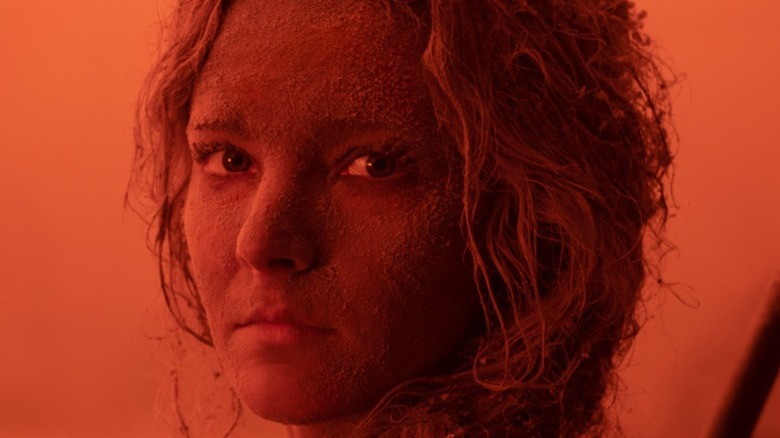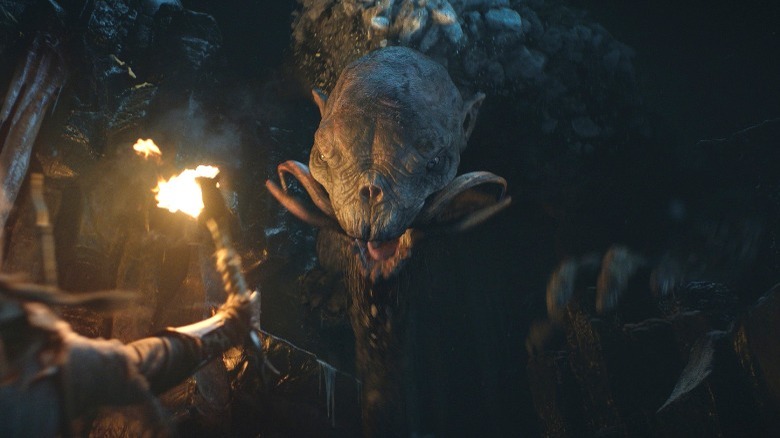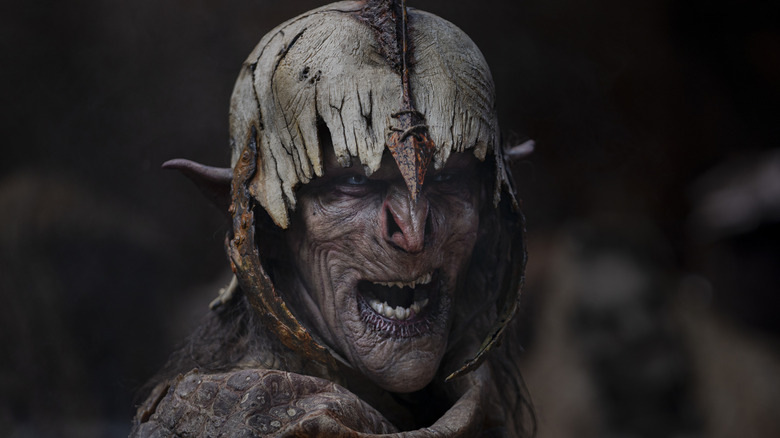Who Is Morgoth On The Lord Of The Rings: The Rings Of Power?
Amazon's "The Lord of the Rings: The Rings of Power" is possibly the most expensive TV show ever created. The new series is loosely based on a fraction of the events depicted in "The Silmarillion," a book J.R.R. Tolkien wrote to elucidate the complete history of Middle-earth. Essentially, functionally, and tonally, it serves as a bible for Tolkien's later work, chronicling genealogies, wars, the movement of great peoples, feats of strength, matters of love, and a healthy dose of inexplicable deific magic. "The Lord of the Rings: The Rings of Power" does not begin where "The Silmarillion" does, however, since to do so would have required animating Eru Ilúvatar molding Arda (read: God creating Earth), and that simply would have been too awesome.
Instead, in the beginning, viewers are treated to a brief retelling of certain events as they are understood by a — relatively — young Galadriel (Morfydd Clark), who speaks prominently of a great evil that befell Valinor, the ancestral home of the Elves. This evil was not Sauron, no, but far worse. This evil was a being to which Sauron was but merely a servant. He goes by many names: the Great Enemy, the Dark Power of the North, the Black Hand ... In the ancient Elven tongue Quenya, he's known as Melkor, which means, "He Who Arises in Might," but in Sindarin, the most common Elven tongue, he's known as Morgoth, which means "Black Foe of the World." Buckle up, nerds — we're breaking down the story of Tolkien's Satan.
Morgoth, first and greatest of the Ainur
Any who are familiar with Christian mythology will find this tale eerily similar. "The Silmarillion" is split into five parts, the first of which is titled "Ainulindalë" and chronicles the cosmogony of Eä, the universe. Before time, at the start of all things, Eru Ilúvatar created the Ainur, powerful beings whose purpose was to carry out the task of creation on his behalf.
Of these entities, Morgoth was the most powerful. Precious little is said to explain the breadth of Morgoth's power, only that it is immense. When all the Ainur were made, they began the Music of the Ainur. As is further evidenced by the powers of Tom Bombadil in "The Lord of the Rings: The Fellowship of the Ring," power is often levied through song in Tolkien's works. As the Ainur sang creation into existence, Morgoth sang in vain glorious dissonance, opting to follow his own melody. From the very beginning, he ignored his duty.
In this way, Arda was in jeopardy even before it fully formed. Morgoth, however, failed in his attempt to mold creation to his sole liking, and Arda was made as Eru Ilúvatar intended ... mostly. Even in failure, Morgoth's music altered the way of things.
Morgoth over the Ages
Despite being a dangerous thorn from practically his first breath, Morgoth was permitted to continue existing, and he used that opportunity to be everyone's problem. He got a few slaps on the wrist, sure, but nothing that would prevent an immortal from acting of his own accord for very long. Even before the events depicted in "The Silmarillion" had fully come to pass, he struck again ... and again ...
The second and third parts of "The Silmarillion" ("Valaquenta" and "Quenta Silmarillion," respectively) chronicle how Arda was populated and the history of the First Age. It's important to note that these two parts cover a period of over 45,000 years. That leads us to the fourth part of "The Silmarillion," "Akallabêth," which covers the Second Age, which is when "The Lord of the Rings: The Rings of Power" takes place. As Galadriel mentions in Episode 1's opening sequence, in all those many years, Morgoth never tired of his mission to destroy Arda and rebuild it under his purview.
While it's possible that Morgoth may make a physical appearance in the Amazon Prime series, it's unlikely. As Eru Ilúvatar before him, Morgoth prefers to let his servants do the hard work. Plus, canonically, Morgoth is still around, even during the Third Age (in which Tolkien's most famous tale is set) and beyond; he's just inactive. And finally, it seems as if the new series plans to focus on Sauron, who's an easier foe.


